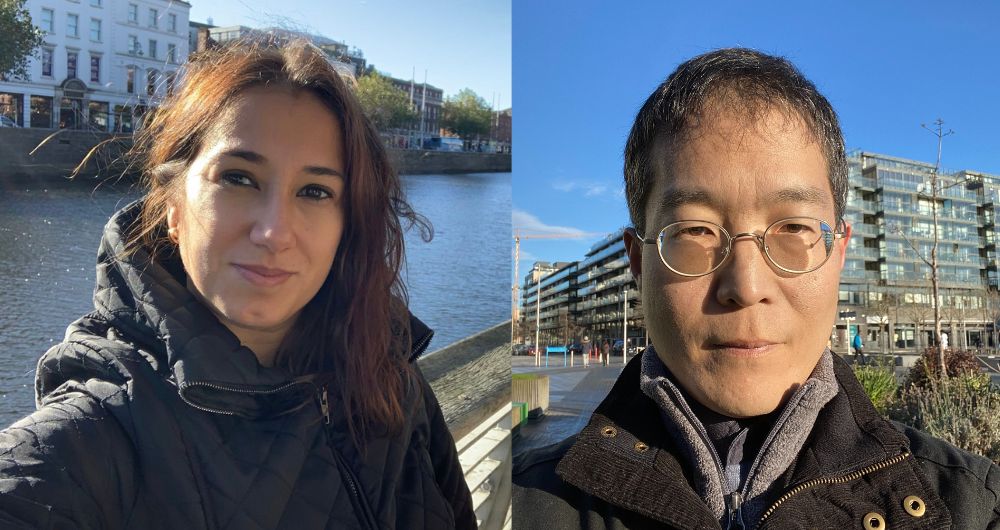
Pictured L-R Dr Inmaculada Gomez Soler and Dr Hyowon Lee
How can technology be used to help students who are learning a second language?
Insight is currently engaged with researchers from TU Dublin and internationally, with the aim of developing and deploying L2L: Enhancing Synchronous Interactions in Telecollaboration for Second Language Learning with Continued Self-reflection by Visualising Interactions.
In short it is a system that facilitates learning of a second language by pairing students from different countries learning each others’ native language via Zoom. L2L monitors the conversation and offers feedback to participants about their reactions, interactions and engagement.
This collaboration will further develop the L2L system, and pilot its deployment in multiple EU universities.
Insight’s Dr Hyowon Lee and SALIS’s Dr Inmaculada Gomez Soler write about the work they are doing below.
We have been working on developing and deploying a web-based conversation visualisation system called L2 Learning to help students learning and practicing a second language (L2) (French, Spanish, German and Italian).
For example, Module SP373 Spanish Language Culture and Text in SALIS run by Dr Gomez Soler involved a series of telecollaboration sessions with a partner university students in Spain who are, in turn, learning English. A typical telecollaboration session was a 1-hour Zoom session between two DCU students (learning Spanish) and 1 Spanish student (learning English). Participants discussed various topics related to their upcoming semester abroad. The session was recorded by Zoom on the cloud and, by accessing the audio recordings of individual students’ audio to determine the start and end of each utterance, the L2 Learning system calculates various metrics to show how the conversation went. For example, it measures how much each student spoke, how often there was a turn-taking and who talked to whom. It also measures the level of interruptions and liveliness throughout the conversation. These metrics are then visualised for the students (and the lecturers) to review and reflect on their performance. This is done so that they get maximum benefit from their sessions. L2L’s benefit to language students relies on its ability to map a conversation into easy-to-understand graphs which facilitate reflection after students engage in fast-paced (high anxiety) videoconference-based interactions.
Every semester over the past two years, we have deployed the system in DCU and TU Dublin (and their partner universities in France, Spain, Germany, Italy and Belgium), and every time we have refined and revised the system features according to the feedback received from students and lecturers. Now, we’re into the 5th semester of the L2 Learning system being deployed, and so far we have 12 participating universities in Europe totalling over 1,200 students generating over 1,000 hours of telecollaboration recordings to be analysed, visualised and reviewed. Last semester we also expanded the system to the University of Limerick bringing in an additional 39 Irish students and a similar number of Spanish students from their partner university in Spain.
Feedback from student was positive:
“It was helpful in a way that I was able to monitor my own participation and ensure that I was contributing to the conversation enough! It was also easy to see where there was a difficulty in communication and I could then reflect on the reason of this difficulty.”
“I found it really interesting to see how I was improving as the weeks progressed. It was also interesting to see who spoke the most and how the conversation went according to the graph.”
Those involved are:
Module lecturers and their students learning 2nd languages in DCU, TU Dublin, University of Limerick, Paris Science & Lettres (France), ICHEC Management School (Belgium), INALCO University (France), Universidad de León (Spain), Universidad de Valencia (Spain), University of Hildesheim (Germany), University of Aix-Marshill (Spain), University of Milan (Italy), Universidad Autónoma de Madrid (Spain), Université de technologie Troyes (France).
Proposers: Dr. M Liu (DCU), Dr. M Scriney (DCU), Dr. H Lee (DCU), Dr. A Dey-Plissonneau (DCU), Prof. A. Smeaton (DCU), Dr. P Molina (TU Dublin), O. Gabaudan (TU Dublin), Dr. S. Nocchi (TU Dublin), Dr. S. O’Shaughnessy (TU Dublin), N. Cazaux (TU Dublin)
Collaborators: University of Léon, Spain, (University of Valencia, Spain), University of Milan, Italy, University of Hildesheim, Germany, ICHEC Brussels Management School, Belgium), Inalco Plidam, Paris, France